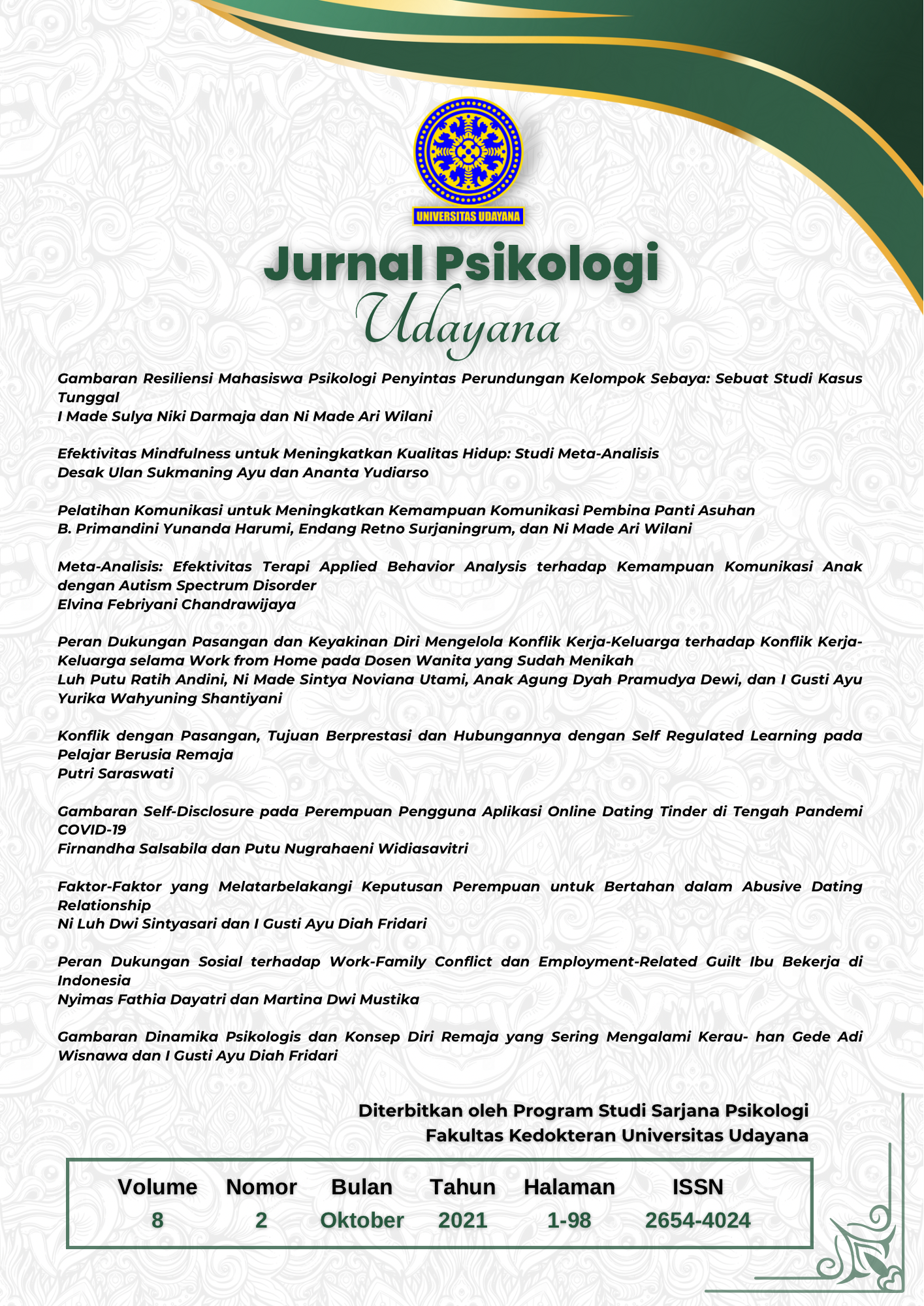Pelatihan Komunikasi untuk Meningkatkan Kemampuan Komunikasi Pembina Panti Asuhan
Abstract
Communication is a process of delivering and receiving messages. Communication problem can arise between adults and adolescents in a foster house. This study aims to determine the effect of communication training to increase educators’ communication skill in a foster house. This study used pre-experimental design method with one group pretest-posttest design where only one group given treatment. The research sample was 7 educators who interacts with adolescents in a foster house in Bali. Measurements use observation based indikator for communication aspects of DeVito (2016) and interview to evaluate and follow up after the communcation training ended. The training was given for 2 days. Data was analyzed using Wilcoxon signed rank test. The results show that communication training is effective to increasing communication skill of foster house’s educators.
Downloads
References
Brown, N. (2011). Psychoeducational Groups: Process and Practice. New York: Routledge.
Dailey, R.M. (2016). Parent-Adolescent Communication. In Berger, C.R. & Roloff, M.E. (Eds.). The International Encyclopedia of Interpersonal Communication, 1st Edition. New Jersey: John Wiley & Sons.
Desmita. (2016). Psikologi Perkembangan Peserta Didik. Bandung: Rosda Karya.
DeVito, J.A. (2016). The Interpersonal Communication Book. Essex: Pearson Education.
Dorsey, S., Farmer, E. M. Z., Barth, R. P., Greene, K. M., Reid, J., & Landsverk, J. (2008). Current Status and Evidence Base of Training for Foster and Treatment Foster Parents. Children and Youth Services Review, 30(12), 1403-1416.
Eriksson, M., Ghazinour, M., & Hammarstorm, A. (2018). Different uses of Bronfenbrenner’s ecological theory in public mental health research: what is their value for guiding public mental health policy and practice? Social Theory & Health, 16, 414-433.
Fitriani, D. (2017). Peran Orang Tua Asuh Dalam Pembinaan Kepribadian Anak Asuh Di Panti Asuhan Darul Hadlanah Suruh Kabupaten Semarang Tahun 2017. Skripsi. Fakultas Ilmu Tarbiyah IAIN Salatiga. Diunduh pada 3 Juni 2020 dari http://e-repository.perpus.iainsalatiga.ac.id/2136/
Haq, K. (2016). Pengaruh Pelatihan Komunikasi Efektif Terhadap Kemampuan Komunikasi (Mahasiswa Tingkat Akhir Program Studi Psikologi Universitas Mulawarman Samarinda. eJournal Psikologi, 4(4), 404-418.
Jacobson, T. (2014). Say This, Not That: Talking Tips for Parents of Teens with Special Needs. Diunduh dari https://www.friendshipcircle.org/blog/2017/08/14/say-this-not-that-talking-tips-for-parents-of-teens/ pada 2 Januari 2020.
Jones, A.M. & Morris, T.L. (2012). Psychological Adjustment of Children in Foster Care: Review and Implication for Best Practice. Journal of Public Child Welfare, (6), 129-148.
Lukens, E. (2015). Psychoeducation. obo in Social Work. doi: 10.1093/obo/9780195389678-0224
Morreale, S.P., Spitzberg, B.H., & Barge, J.K. (2007). Human Communication: Motivation, Knowledge, and Skills 2nd Edition. Belmont: Thompson Wadsworth.
Muhammad, A. (2004). Komunikasi Organisasi. Jakarta: Bumi Aksara.
Peraturan Menteri Sosial Republik Indonesia No. 106/HUK/2009 Organisasi dan Tata Kerja Panti Sosial di Lingkungan Departemen Sosial. 31 Juli 2009
Piel, M.H., Geiger, J.M., Julien-Chinn, F.J. & Lietz, C.A. (2016). An Ecological Systems Approach to Understanding Social Support in Foster Family Resilience. Child & Family Social Work, 22(2).
Rahmah, S., Asmidir, & Nurfahanah (2016). Masalah-Masalah yang dialami Anak Panti Asuhan dalam Penyesuaian Diri dengan Lingkungan. Konselor, 3(3).
Rajabany, M.F. (2015). Komunikasi Interpersonal Pengasuh dengan Anak Asuh di Panti Asuhan Bayi Sehat Muhammadiyah. Prosiding Penelitian SpeSIA 2015.
Raphael, B. & Wilson, J.P. (2000). Introduction and Overview: Key Issues in the Conceptualization of Debriefing. In B. Raphael & J.P. Wilson (Eds.). Psychological Debriefing: Theory, Practice and Evidence. Cambridge: Cambridge University Press
Santrock, J. W. (2011). Life-span Development 13th Edition. New York: McGraw Hill.
Sarwono, S. (2015). Psikologi Remaja. Jakarta: Raja Grafindo.
Segrin, C. & Flora, J. (2011). Family Communication Second Edition. New York: Routledge.
Syawal, A. & Sailan, M. (2015). Peranan Panti Asuhan dalam Pembentukan Moral Anak (Studi Pada Yayasan Panti Asuhan Bustanul Islamiyah, Kecamatan Panakukkang, Kota Makassar). Jurnal Tomalebbi.
Visschers-Pleijers, A. J. S. F., Dolmans, D. H. J. M., de Grave, W. S., Wolfhagen, I. H. A. P., Jacobs, J. A., & van der Vleuten, C. P. M. (2006). Student Perceptions About the Characteristics of an Effective Discussion During the Reporting Phase in Problem-Based Learning. Medical Education, 40(9), 924–931.
Zolten, K. & Long, N. (2006). Parent / Child Communication. Arkansas: Department of Pediatrics University of Arkansas.

This work is licensed under a Creative Commons Attribution-ShareAlike 4.0 International License.
Authors who publish with this journal agree to the following terms:
- Authors retain copyright and grant the journal right of first publication with the work simultaneously licensed under a Creative Commons Attribution-ShareAlike 4.0 International License that allows others to share the work with an acknowledgement of the works authorship and initial publication in this journal.
- Authors are able to enter into separate, additional contractual arrangements for the non-exclusive distribution of the journals published version of the work (e.g., post it to an institutional repository or publish it in a book), with an acknowledgement of its initial publication in this journal.
- Authors are permitted and encouraged to post their work online (e.g., in institutional repositories or on their website) prior to and during the submission process, as it can lead to productive exchanges, as well as earlier and greater citation of published work (See The Effect of Open Access).













